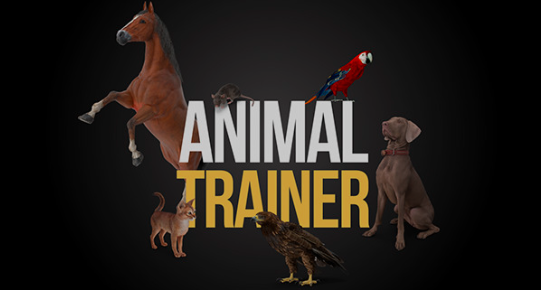Nurturing Bonds and Facilitating Understanding: The Comprehensive World of Animal Trainers

Historical Evolution of Animal Training
1 Early Domestication and Bonding
The history of animal training can be traced back to the early domestication of animals. Humans formed bonds with animals for various purposes, including hunting, agriculture, and companionship. The reciprocal nature of these relationships laid the foundation for training methodologies.
2 Circus Performances and Entertainment
In the 19th and early 20th centuries, animal training gained popularity through circus performances. Trainers showcased the intelligence and agility of animals in captivating acts, shaping public perception and sparking interest in the art of training.
3 Evolution of Positive Reinforcement
As our understanding of animal behavior advanced, a shift towards positive reinforcement occurred. Trainers began emphasizing reward-based techniques, fostering cooperation and trust between humans and animals.
Educational Pathways for Animal Trainers
1 Animal Science and Behavior Studies
Formal education in animal science and behavior studies provides a solid foundation for aspiring animal trainers. Academic programs cover topics such as ethology, psychology, and anatomy, offering a comprehensive understanding of the intricacies of animal behavior.
2 Specialized Training Programs
Many animal trainers pursue specialized training programs focused on the species they intend to work with. These programs often include hands-on experience and mentorship, allowing trainers to develop practical skills in a controlled environment.
3 Continuous Learning and Professional Development
Staying abreast of advancements in animal behavior science is crucial for animal trainers. Continuous learning through workshops, seminars, and conferences ensures trainers are equipped with the latest knowledge and techniques.
Roles and Responsibilities of Animal Trainers
1 Establishing Trust and Relationship Building
The foundation of successful animal training lies in establishing trust and building positive relationships with animals. Trainers invest time in understanding each animal’s unique personality, creating a bond based on mutual respect.
2 Designing and Implementing Training Programs
Animal trainers are responsible for designing and implementing training programs tailored to the needs and abilities of individual animals. Programs may include behavior modification, obedience training, and performance routines, depending on the context.
3 Addressing Behavioral Issues
Animal trainers play a crucial role in addressing behavioral issues in animals. Whether working with household pets or zoo animals, trainers employ techniques to modify undesirable behaviors and promote positive habits.
Specialized Modalities in Animal Training
1 Canine Training and Obedience
Canine trainers focus on training dogs for various purposes, including obedience, agility, and specialized tasks. Positive reinforcement techniques are widely employed to ensure that training experiences are enjoyable for the animals.
2 Marine Mammal Training
Marine mammal trainers work with dolphins, whales, and seals, often in aquariums or marine parks. Training these intelligent creatures involves a combination of positive reinforcement, play, and interactive sessions.
3 Avian Training for Birds
Avian trainers specialize in working with birds, including parrots, falcons, and birds of prey. Training programs may encompass flight training, behavioral enrichment, and interactive displays for educational purposes.
Challenges Faced by Animal Trainers
1 Understanding Species-Specific Behaviors
Each species has unique behavioral traits and communication methods. Animal trainers face the challenge of understanding and adapting to these species-specific behaviors to ensure effective training.
2 Ensuring Animal Welfare
Balancing training objectives with the well-being of animals is a constant challenge. Trainers must prioritize ethical considerations, providing enriching environments and positive experiences for the animals under their care.
3 Communication with Animal Owners and Caretakers
In cases where trainers work with pets or animals owned by others, effective communication with owners or caretakers is essential. Aligning training goals, addressing concerns, and maintaining open lines of communication contribute to successful outcomes.
Rewards and Opportunities in Animal Training
1 Fostering Human-Animal Connections
One of the most rewarding aspects of animal training is the opportunity to foster deep connections between humans and animals. Trainers witness the transformation of relationships, creating harmonious bonds based on trust and cooperation.
2 Contribution to Conservation and Education
Animal trainers in conservation settings contribute to the preservation of endangered species. Educational programs and interactive displays help raise awareness about the importance of wildlife conservation and the role of trained animals in these efforts.
3 Professional Growth and Entrepreneurial Ventures
Experienced animal trainers often have opportunities for professional growth. Some may choose to start their own training businesses, offering services ranging from basic obedience training to specialized consultations for unique behavioral challenges.
Technology’s Influence on Animal Training
1 Positive Reinforcement Devices
Technology has introduced positive reinforcement devices that aid trainers in reinforcing desired behaviors. Clickers and treat dispensers are examples of tools that enhance the precision and timing of rewards during training sessions.
2 Virtual Reality (VR) for Training Simulations
Virtual Reality (VR) is being explored as a tool for training simulations. Trainers can use VR to simulate various scenarios and behaviors, providing a controlled environment for learning and practice.
3 Online Platforms for Training Resources
The digital era has brought forth online platforms offering resources for animal trainers. Training videos, webinars, and forums provide a space for knowledge-sharing and professional development within the global community of animal trainers.
The Future of Animal Training
1 Advancements in Understanding Animal Cognition
Ongoing research in animal cognition contributes to a deeper understanding of how animals think and learn. Future advancements may unveil new insights into the intelligence and emotional capacities of various species, influencing training methodologies.
2 Integration of Artificial Intelligence (AI)
Artificial Intelligence (AI) may play a role in analyzing and predicting animal behavior. AI applications could assist trainers in tailoring individualized training plans based on real-time assessments of an animal’s responses and progress.
3 Global Collaboration for Ethical Standards
The future of animal training involves global collaboration to establish and uphold ethical standards. Discussions on animal welfare, conservation efforts, and the responsible use of trained animals will shape the industry’s direction.
Conclusion:
As we conclude this immersive journey, it becomes evident that animal trainers play a pivotal role in nurturing bonds beyond words. Their dedication, compassion, and commitment contribute to a world where the harmony between humans and animals is not just a goal but a beautifully realized reality. The art and science of animal training unfold as a profound endeavor that transcends communication barriers and nurtures bonds beyond words. Trainers emerge as stewards of understanding, fostering connections that enrich the lives of both humans and animals.







